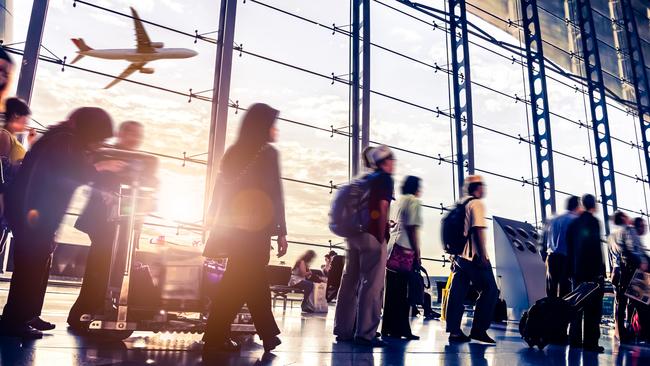Airlines unite to fight ‘pay on delay’ laws they say will force airfares up and safety down
Carriers have come together in an attempt to shoot down proposed ‘pay on delay’ laws, saying a requirement to compensate for late flights will only drive up fares and undermine safety.
International airlines have told a Senate committee examining the merits of a “pay on delay” bill that the proposed legislation will only lead to higher airfares and compromised safety standards.
Liberal Senator Dean Smith and Nationals Senator Bridget McKenzie introduced the airline passenger protections bill in February in response to high rates of delayed or cancelled flights, and mishandled baggage.
In an effort to improve the experience of air travel, the bill proposed a legally enforceable code of conduct for airlines, including compensation for delays of more than three hours.
Countries in Europe and North and South America already require airlines to compensate passengers for lengthy flight delays through fixed payments ranging from $125 in Canada to $1800 in Brazil.
The Board of Airline Representatives of Australia, which counts Singapore Airlines, Qatar Airways, Air New Zealand and Malaysia Airlines among its membership, said there was no evidence the overseas schemes resulted in fewer flight delays and cancellations.
“This is because they do not recognise the complexity of the entire aviation ecosystem or apportion accountability across all stakeholders including airports, air traffic control providers and government border and security agents,” BARA executive director Stephen Pearse said.
“Mandatory passenger compensation schemes targeted at airlines alone do however add to the regulatory cost burden born by airlines, which inevitably results in upward pressure on airfares.”
Mr Pearse also pointed out that flight delays and cancellations had significantly reduced since the difficulties experienced when borders reopened in 2022.
“The introduction of this bill in Australia may therefore be based on a perception of airline customer service that is now historic,” he wrote.

Airlines for Australia and New Zealand (A4ANZ) took a similar view, suggesting the bill relied on “out-of-date” statistics and a lack of understanding about what other factors could disrupt travel.
A4ANZ chief executive Alison Roberts said overseas schemes had created legal challenges and increased costs “with lawyers the main winners”.
She said there was a backlog of more than 71,000 claims in Canada, and the European legislation had been subject to over 70 interpretations by the Court of Justice.
“Safety must remain airlines’ main priority,” said Dr Roberts, whose members include Qantas, Virgin, Rex and Air New Zealand.
“There is a genuine risk this culture could be undermined by factors which may push behaviour that seeks to minimise or avoid financial penalties.”
Rex also warned the company could not afford compensation for delays on regional routes because margins were too small.
“Any additional layers of administration and cost is of concern to Rex,” the airline’s submission said.
Virgin Australia’s submission highlighted that protections already existed under Australian Consumer Law (ACL) but acknowledged there could be greater awareness of this framework.
“The operation of the ACL and the intense competition that most airlines in Australia face, mean airlines are already incentivised to ensure they meet their obligations under the consumer guarantees,” Virgin’s manager of government affairs Stephen Beckett said.
The legislation is being examined ahead of the aviation white paper, which is also examining the need for greater consumer protections.
Those in favour of the bill included the Australian Lawyers’ Alliance, which said there was currently no consumer protection laws specific to aviation.
“While consumers can derive some rights from a few different sources, the process involved
in discovering and enforcing those rights is, at best, complicated for some consumers and
at worst completely inaccessible for other consumers,” ALA chair Victoria Roy said.
The closing date for submissions has been extended to August 30.






To join the conversation, please log in. Don't have an account? Register
Join the conversation, you are commenting as Logout